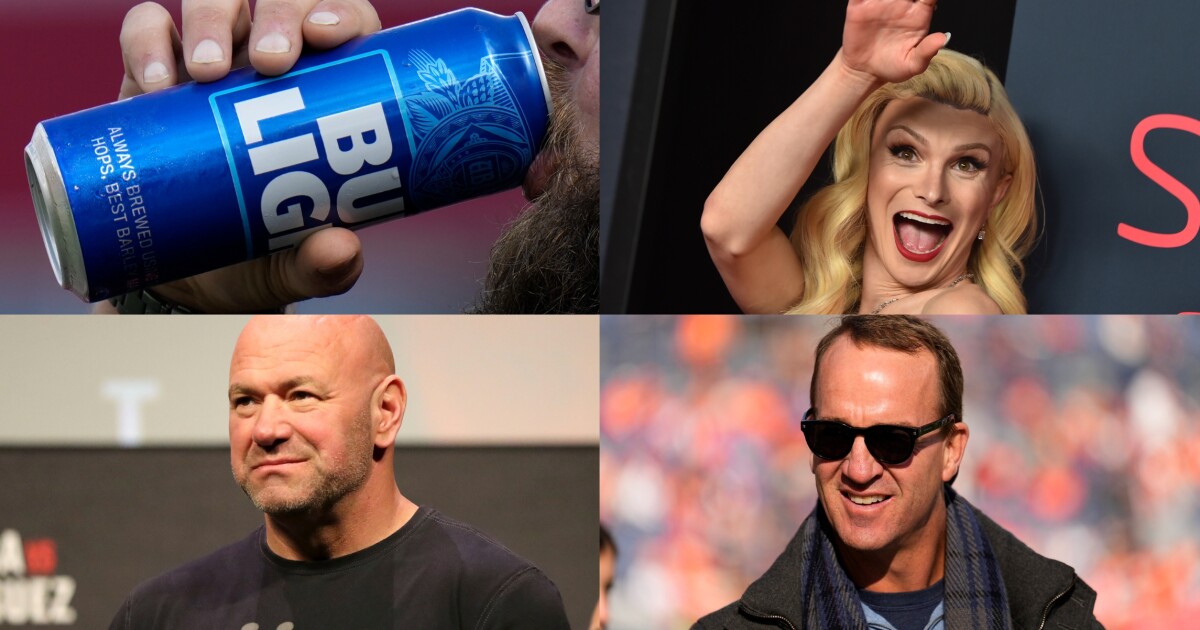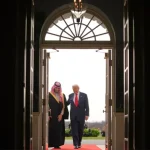

Bud Light underwent a wild year in 2023, largely due to a partnership the brand did that led to decreased sales and major pushback on social media.
It started in late March over a partnership with transgender social media personality Dylan Mulvaney. Mulvaney, a biological male who identifies as female, received a can featuring the influencer’s face to commemorate Mulvaney’s “1-year anniversary as a trans woman.” Since then, the beer brand underwent one of its worst years, losing its top spot as the most popular beer in the United States.
GOP SENATORS LOOK TO CRACK DOWN ON FOREIGN ESPIONAGE WITH TOUGHER REPORTING REQUIREMENTS
March 31
Mulvaney posted a video on social media enjoying several cans of Bud Light and showing a photo of a customized Bud Light can. Many conservatives, including commentator Tomi Lahren, criticized Bud Light for the partnership, with Lahren asking her followers if “a man pretending to be a woman (in the most demeaning manner possible)” was an effective strategy to sell beer.
Before the partnership with Bud Light, Mulvaney had been criticized for partnerships with other brands, such as Kate Spade. Mulvaney also visited the White House in October 2022 to discuss states banning transgender surgeries for children with President Joe Biden.
April
In the wake of the massive pushback Bud Light received online, Bud Light’s social media sites on Instagram and Twitter, now known as X, went silent and did not post any content for roughly two weeks. Anheuser-Busch, the owner of Bud Light, issued a statement from CEO Brendan Whitworth clarifying the company did not intend “to be part of a discussion that divides people.” The statement did not address Mulvaney directly.
In the same month, Budweiser, also owned by Anheuser-Busch, released an ad about the “American spirit.” However, the ad was largely ridiculed, with many claiming it was simply an attempt at damage control by Anheuser-Busch.
May
Early in the month, it was reported that Anheuser-Busch was offering its front-line employees and wholesalers financial support, as they had received the brunt end of Anheuser-Busch’s financial battering following the partnership with Mulvaney.
A few days later, Anheuser-Busch cut ties with the third-party ad agency that was at the center of Bud Light’s partnership with Mulvaney, according to a letter sent to Anheuser-Busch distributors.
June
Bud Light returned to Twitter on June 22 after not posting anything for over two months. Like its post on April 14, the return to social media was largely rejected by consumers.
Whitworth also committed to supporting the LGBT community, stating that Bud Light has supported the community “since 1998.” When asked if he would allow Bud Light to gift Mulvaney the can again if given a second chance, Whitworth did not give a definitive “yes” or “no.”
July
Bud Light announced the “Bud Light Backyard Tour” on July 13, which was held in August throughout several states, including Tennessee, Oklahoma, Missouri, and Virginia. Performers who were announced to partake in the music tour included OneRepublic, Midland, Dashboard Confessional, and Bush.
On July 27, Anheuser-Busch announced it would fire roughly 350 employees, which made up “less than 2%” of its more than 19,000 employees in the United States. The layoffs would affect the company’s corporate staff, while front-line workers, such as warehouse staff and delivery drivers, would not be affected, according to Axios.
August
Anheuser-Busch revealed in a second-quarter report that its revenue fell by 10% in the U.S., while its sales in U.S. retailers went down by 14% when compared to the previous year, equating to a near-$400 million loss. The company attributed its decrease in revenue and sales to Bud Light.
The company also sold off eight of its labels to Tilray Brands, a cannabis company based in New York City. The purchase by Tilray Brands included Shock Top, Breckenridge Brewery, Blue Point Brewing Company, 10 Barrel Brewing Company, Redhook Brewery, Widmer Brothers Brewing, Square Mile Cider Company, and HiBall Energy.
During August, the heir of Anheuser-Busch, Billy Busch, criticized Bud Light’s partnership with Mulvaney, stating he believed his ancestors “would have rolled over in their graves.” He also said he would be the first to buy the Bud Light brand off its parent company should it ever sell it, with the aim to “make that brand great again.”
September
Billionaire and Microsoft co-founder Bill Gates bought over 1.7 million shares of Anheuser-Busch, worth roughly $96.5 million.
The ad firm Captiv8, which was linked to the partnership between Anheuser-Busch and Mulvaney, announced in September it would fire 20% of its workforce, or roughly 30 employees, according to a report. Captiv8 confirmed to the Washington Examiner it had chosen to reduce its workforce but did not provide a specific reason why the layoffs happened nor the specific number of employees laid off.
October
Bud Light partnered with Ultimate Fighting Championship in October to become the sponsor of the mixed martial arts company, with the reported nine-figure sponsorship set to last six years. UFC President Dana White defended the partnership, arguing he is looking at “all the good things” Anheuser-Busch has done, such as employing veterans.
On Oct. 31, Bud Light’s parent company reported a 13.5% decline in its third-quarter U.S. revenue per 100 liters, which is a key measure used for beer sales. Anheuser-Busch InBev has also reported its sales to U.S. retailers going down by almost 17% “primarily due to the volume decline of Bud Light,” according to the report.
CLICK HERE TO READ MORE FROM THE WASHINGTON EXAMINER
November
Anheuser-Busch InBev CEO Michel Doukeris cited a poll that stated 40% of ex-Bud Light consumers were willing to buy the drink again. This poll provided some hope for the brewing company, with Anheuser-Busch committed to investing in Bud Light “and all the platforms that consumers love,” Doukeris said.
December
Bud Light recruited the help of two football legends, former Dallas Cowboys player Emmitt Smith and former Denver Broncos player Peyton Manning, for an ad campaign called “Easy Rounds.” Smith explained in an interview that every brand “goes through iterations of highs and lows” and that Bud Light itself is “an iconic brand.”






